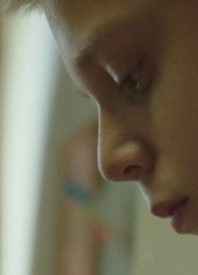
A few women use the same cramped space. A person lives in a gig economy, one that isn’t just a trend in the Western world. A boy needs parental care. These are the kind of stories we see at the second half of Shorts Not Pants. A mostly good bunch of shorts except for one. I have reasons for breaking up my coverage into two pieces but I’m not getting into why. Let’s begin.
“Wow” is what I’ll say about the short representing the fifth and next block of shorts, Angelika Abramovitch‘s Catcave Hysteria. It shows snippets of stories of different young women sharing the same dingy bathroom at a club that you couldn’t pay me to go to again. Didn’t know that Sweden had facilities like this. Some of the snippets include two women hooking up in the bathroom while Robyn plays in the background. A woman overheard her friends talking crap about her. The short’s centrepiece though is about two sisters facing different problems. Raw in the best ways.
In Jaagran, an auto rickshaw driver, Rameshwar (Tanmay Vekaria), verbalizes a passing thought that comes through his head. He spends a long night of driving people including a rich kid in Mumbai’s affluent beachy neighbourhood. So he tells both his whife (Gayatri Soham) and the neighbourhood cop that he wants to rob the rich kid. There’s great use of night photography here. It also balances the story’s comic and tragic parts well.
Anthropomorphism seems to be the trend in this year’s animation selections. Although Paul Muresan’s Cradle is the third animation short I’m watching as part of this fest so I don’t think two is a trend yet. Anyway, the short tells the story of a woman trying to raise her child while living with an alcoholic husband. A bit sentimental but what does one expect about a short about alcoholism? Love the parchment like aesthetic which Muresan achieves through a computer. A young talent to watch. Cradle is showing as part of the sixth block which one can catch on the big screen on the 19th.
Speaking of a balancing act, Olha Zhurba’s Dad’s Sneakers, for the most part, does a good job of balancing the gripping moments of its story with its downtime. Interestingly enough, the short’s climax shows the latter. Protagonist Sasha (Bohdan Zenchenko) memorizes the thing he should say to the woman adopting him. He eventually plays with the chairs in his orphanage’s auditorium, as if memorizing the sensations of a place that he has bittersweet memories of already. Something almost ruins this perfect day, which adds to the literal dramatic blow that makes the short mostly effective. Dad’s Sneakers plays as part of the festival’s seventh block of shorts, screening on the 20th.
Also playing on the seventh block is a short about honesty. In Sajjad Shahhatami‘s Identibye, person stands on top of a mid or high rise building in an Iranian city. Viewers can assume that that person is a woman because they wear a modern version of acceptable womenswear under the rule of the Islamic Republic. But upon a closer look it shows that that person has a beard. The scenes before and after show an AMAB person (AmirHossein Sabbaghan) before their transition. The drone shot is great, the imagery makes for economic storytelling. Some of the images can negate its progressive message but for the most part it’s a step in the right direction for LGBT+ MENA representation.
Sometimes what viewers see is what they get. Playing on the 20th as a part of the last block of shorts for this fest is Konrad Kultys’ Stagnant, about Adam (Igor Kowalunas), a quadriplegic skinhead who parties whenever he wants. Meanwhile, his brother Tom reluctantly takes care of him. But not for long, as Tom has to leave their home country of Poland for a job in Germany, leaving Adam potentially under the care of Jarek, a caretaker. This short misrepresents two groups at once and the ending makes no sense.
The last film I’m writing about for this piece is Murder Tongue, also playing a part of the last block. It’s 1992 in Karachi. The city’s demographics are unique to Pakistan in that it has the most amount of Urdu speakers. It owes that anomaly to the people who immigrated there after the Partition in India. 1992, though is a violent year for the Urdu majority there, as the characters in this film experience things no one should. Things like going to the hospital because one of their neighbours ends up in an ‘accident’.
Abdul Aziz Ansari (Munawar Saeed) is that man going to the hospital to see if his son is still alive. A police stop over almost becomes deadly, as the majority Sindh police force crack down on Urdu speakers who are on the receiving end of violence. Murder Tongue reminds us of what we in the West take for granted. To us, speaking more than one language is a privilege, but at that time and place, it was a matter of survival. Ali Sohail Jaura’s film makes for powerful way to end the fest.
- Release Date: 11/19/2022



